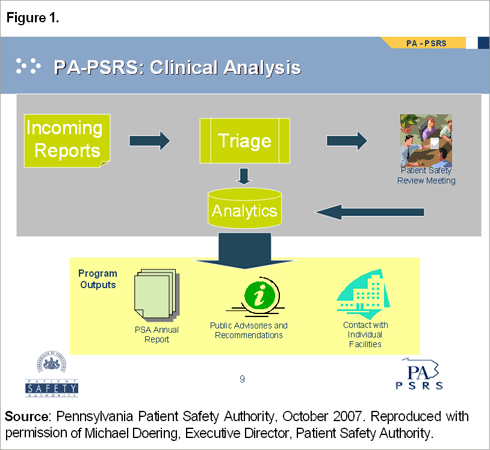With Governor Ed Rendell's support, Pennsylvania is undertaking a multifaceted approach to improve both health care quality and safety. State officials are working to align initiatives led by the Pennsylvania Health Care Cost Containment Commission, departments of Health, Public Welfare, and Insurance, and an independent Patient Safety Authority (PSA). [3]
PSA does not have the authority to regulate health care organizations. Instead, it collects and analyzes data, and provides guidance and educational tools to improve patient safety. In 2004, Pennsylvania became the first state to require reporting of near misses, in addition to actual errors. Pennsylvania hospitals and other health care facilities must report "serious events" and "incidents" (i.e., near misses) to PSA on a monthly basis, using a confidential Web-based data collection system. [4] PSA reviews and evaluates the reports to identify trends and make recommendations for improvement.
The vast majority of reports (over 96%) are "near misses," providing crucial insights into how to avoid errors according to PSA executive director Michael Doering. "The press wants to know about events that cause serious harm, but it can be argued that it's even more important to know about near misses so we learn and share how errors were avoided," he says.
PSA provides detailed reports on adverse events to individual facilities and aggregates information into regional and statewide reports. In addition, they provide recommendations through Patient Safety Advisories. So far, they have published about 140 articles with recommendations on how to avoid specific types of harmful events. PSA also develops toolkits and other educational materials on patient safety principles and root cause analysis, including a CD-based training course. It communicates through its Web site and presentations at hospitals, state and national conferences, and patient safety organizations. It is working with the Health and Hospital Association of Pennsylvania to develop curricula to inform hospital board members about the importance of patient safety. PSA also distributes a "Speak Up" brochure using information developed by the Joint Commission that encourages patients to ask questions to help ensure their safety (Figure 1).

PSA receives almost 17,000 reports each month from over 400 facilities, and the numbers are rising. Authorities believe this indicates better compliance and greater desire to learn from the data, rather than an actual increase in near misses or adverse events. But according to Doering, "the ultimate success is not in the number of reports, but in how facilities and individual providers use the information fed back to them to improve patient safety."
It is difficult to quantify the impact of PSA's efforts. "When people ask how many lives did you save last year, I have to admit that I don't know," Doering says. "It's hard to assign numbers and a value to our results." According to its annual survey of patient safety officers, facilities appear to be paying attention, want to learn from the data, and are implementing a significant number of policy and procedure changes based on the guidance provided by the PSA.
One lesson from Pennsylvania's experience is that adequate, stable financing is important. PSA is funded through an assessment on facilities, with a budget of about $4 million a year—a significant commitment compared with most other states.
|